By Maddy Butcher
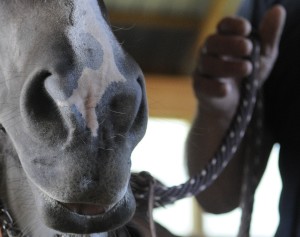 Feel.
Feel.
Researchers cringe at the term.
Horse owners get confused.
What is it? And why does it matter?
The journey of understanding feel can last a lifetime. It’s easier to grasp if you consider it a large, gradual acquisition of knowledge and not just a definition to memorize. Like learning a new language or having faith in a religion; it takes thoughtfulness and commitment. It’s a process full of countless, seemingly mundane moments occasionally interrupted by bright points of epiphany.
Those epiphanies will vault you to the next level of understanding and awareness.
Once you have a grasp of it, you’ll understand that feel doesn’t just apply to horse work. In fact, I learned about feel in horse work through my non-riding sons.
Considering horsemanship, kayaking, and soccer:
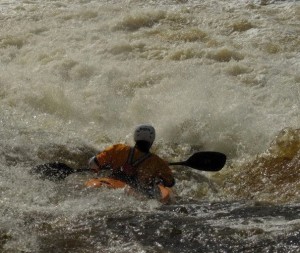 Beau, is a college student and passionate kayaker. He took up the sport six years ago and has since paddled some of the country’s most challenging rivers, navigating Class V rapids (the most difficult rank as determined by the International Scale of River Difficulty).
Beau, is a college student and passionate kayaker. He took up the sport six years ago and has since paddled some of the country’s most challenging rivers, navigating Class V rapids (the most difficult rank as determined by the International Scale of River Difficulty).
He writes:
“As an experienced whitewater boater, I’ve had the opportunity to be consumed by the river, to feel tiny amongst massive forces…I attribute my success to working with the river and not against it.
“To be tuned to react to any ripple in the eddy line, to use recirculating waves to control my speed, and to know where to plant my paddle blade are lessons taught by the river, not by humans.
“What I have with the river is not so much a friendship, but a bond like a child has to a parent…It offers countless lessons. As 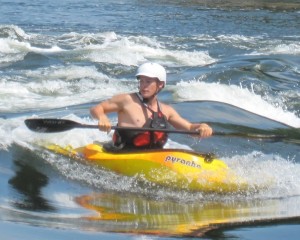 long as you let it teach you.”
long as you let it teach you.”
Beau’s river is my horse.
More than any book, DVD, or real-live clinician, my own observations of horses’ responses and initiatives have helped improve my horsemanship. Sometimes, I’ll just sit and watch them move and communicate with each other. Sometimes in the saddle, I’ll close my eyes to better feel their movement.
Aidan, Beau’s older brother, has excelled at soccer. He was the defensive anchor on a college team that twice advanced in the NCAA tournament.
His attitude toward games parallels how I approach trail rides. From the outsider’s perspective, it looks like just another day. But it’s a unique, collective experience:
He writes:
“Playing soccer is like taking part in a painting that paints itself. You have a role in the outcome of the painting, but you alone don’t paint the painting. Every game produces a new painting, a different painting, one with different strokes, composition, and subject matter.
“Though the game is confined to a certain space, no matter how many games you play, each time you play, the ball – and you – follow a different path, a different trajectory.

“Because the painting is not entirely up to you, and because the painting is different every time, you never get tired of painting, even though you’re playing the same game.”
- Feel, then, is an awareness of action and reaction. It’s an understanding that your thoughts, behaviors, and movements have an impact on your horse.
- But feel is also an awareness of your horse’s actions and behaviors.
- Feel is the product of the horse-rider connection.
Why does feel matter?
Once you embrace the idea of feel, you can become quieter and more effective in your cues.
Great horsemen and women don’t get amazing results because their horses are specially trained. They impress because they notice things we don’t. They react to messages we haven’t even seen or heard. They have more responsive horses because they themselves are more responsive.
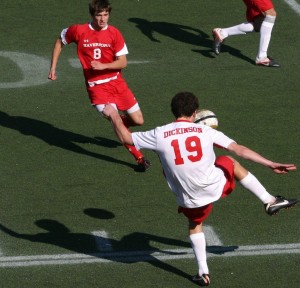 For a new soccer- kayak, or riding fan, lots of important developments will go completely unnoticed. That’s why the uninformed think certain sports are so ‘boring.’ Or as horseman Mike Kevil noted, ‘watching a colt starting can be a little like watching paint dry.”
For a new soccer- kayak, or riding fan, lots of important developments will go completely unnoticed. That’s why the uninformed think certain sports are so ‘boring.’ Or as horseman Mike Kevil noted, ‘watching a colt starting can be a little like watching paint dry.”
- Was there a time in your life when you didn’t know what ear pinning meant?
- Did you always know that lip-licking was a ‘pressure’s off’ reaction?
- Can you now sense each individual hoof fall when you ride?
Time with horses, awareness, and experience will teach you these things if you let them. And as you develop, actions and reactions will become less conscious efforts. Horses and humans are both capable of forming neural pathways of habit and muscle memory.
Defined without ruler, stopwatch, or scale –
It’s no wonder so many masters struggle to define it with words, direction, or measurement. How do you quantify a process, full of tiny, split-second movements and choices? In any given minute, there might be a dozen horse-human interactions. Some are deliberate. Some are subconscious. Some are unwitting.
Or, as Aidan writes:
“When I play soccer, I don’t feel like I am the one who is playing. My body knows much better where to pass, where to run, where to situate myself, when to tackle (and when not to) than I do. Before I even have the chance to think, my body is already 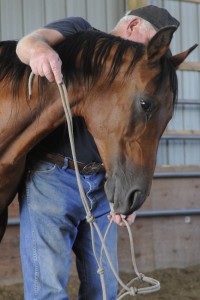 acting. Hence the painting that paints itself.”
acting. Hence the painting that paints itself.”
Need some more examples of feel?
- Hans, the Clever Horse, had a great feel for reacting to the actions of his owner. When the man straightened his back, Hans knew to stop tapping his hoof. His owner didn’t even realize the message his body language sent. But Hans did.
- Elephant researchers had a nice feel when testing to see if the animals could use tools. They recognized that if elephants had to sacrifice their sense of touch and smell by using their trunk, that tool use would be unlikely. So, giving them sticks to reach food was inappropriate. Instead, they put the food up high and gave them a box to stand on.
Bingo. Elephants can use tools.
Looking for some fun, human-to-human examples of feel in Pop Culture?
 Mrs. Hughes, head housekeeper at Downton Abbey, has a great feel for the dynamics of the house.
Mrs. Hughes, head housekeeper at Downton Abbey, has a great feel for the dynamics of the house.

- Michael Scott of The Office does not have feel. Of any sort.
Thanks Maddy(and sons) for describing the difficult to describe reality of feel. Either you have or you don’t…but most are somewhere in the middle. Makes me think of “in the GROOVE…”